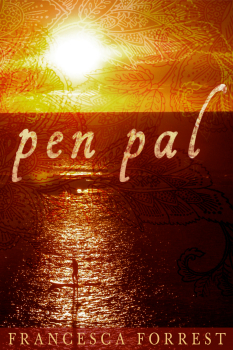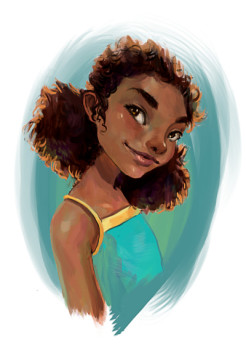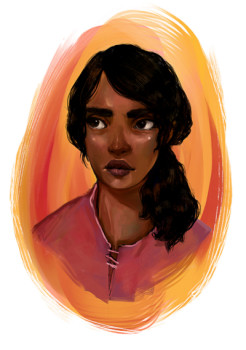Fiction Review: Francesca Forrest’s Pen Pal

This past month, I’ve not been playing much in the way of interactive fiction and my webcomics have fallen behind schedule–in part because I’ve been reading some great prose books. One of the most recent is the novel Pen Pal by Francesca Forrest, a self-published novel that began its life on livejournal and grew up into a full-fledged, completely remarkable fantasy. For those who have been looking for something different than fantasyland fare, this is definitely a novel you should check out.
As the story opens, young Em, a girl from the floating community of Mermaid’s Hands just off the Gulf Coast of the United States, is reaching for the larger world. She loves her community and trusts in the Seafather, the god worshipped by her small village of intertwined boats on the mudflats, but she wants to see more of the world. With the help of a friend, she tosses a message in a bottle into the sea, willing the Seafather to take it somewhere interesting, to someone who will write her back.
Whether through fate or the intervention of two very different gods, the letter ends up in the hands of Kaya, a political prisoner in the country of W–, near Indonesia, whose prison is a faux-temple suspended over Ruby Lake, a lava lake in the center of a volcano. Kaya is from the mountains, making her a minority in her own small country, and her people’s traditional religion, worship of the Lady of Ruby Lake, has been forbidden. Through writing to Em, she begins to examine how she became a political prisoner–she who had once embraced the lowland culture, attended college in America, and sought to advance in life. But her plan to hold a festival for the Lady, just as a cultural celebration, nothing to offend the government, crashes around her ears and sends her hanging perilously above the lava, in solitary confinement, but for letters from her mother and Em and a strangely intelligent crow companion.

The novel shifts mostly between the points of view of Em and Kaya, revealing their thoughts and lives through their letters and their journals, but occasionally includes media coverage of events, e-mails between government officials in W–, and e-mails from one of Em’s teachers. While Kaya’s situation is always perilous, Em’s troubles begin as familiar family issues: her older brother got in with the wrong crowd and went to prison, which tore a hole in her family. Her mother, who had been a drylander before marrying her father and moving to Mermaid’s Hands, has never quite adjusted to life on the water, and Em worries over the arguments her parents have. Her younger sister has a frail constitution and her mother spends every spare cent giving the younger girl medicine from dryland doctors.
But Em’s world isn’t far from disaster. A hurricane strikes and destroys most of her community’s buildings–and the state government decides not to allow them to rebuild. It is only through Em’s ongoing letters to Kaya, who has been asked to make a public statement to quell unrest in her home country, that Mermaid’s Hands finds activists willing to save it. Kaya’s story of her own childhood and her captivity–and the growing violence in her home after her arrest–unfolds at a different speed, and her connection to the Lady, who at first she’s not sure she even believes in, grows as her situation above a volcano, ready to erupt, becomes even more perilous. Again, it is her connection to Em that ends up making all the difference in how the novel concludes.
Forrest has done an amazing job creating two very small, fictional minority communities that come alive on the page. There’s a sense of history behind each of them, a feeling that there are far more details about the culture than ever make it into the story. The settings feel rich in their imaginings and the stories the characters tell themselves have an oral quality that transcends the reading experience. The country of W–, a small nation amongst larger powers, is understandably eager to quell violence from its increasingly vocal minority, and the way they go about it feels as though it could actually happen. Even the most well-meaning people misunderstand each other’s intentions, contributing to greater problems.
Though undeniably political in its message of sympathy for vanishing minority cultures, Pen Pal never preaches; instead, Forrest gives readers two protagonists whose innocence draws us in. Em’s child perspective on the world gives her a sense of black and white morality–until she faces situations where she has to question what she knows. Is loyalty always a virtue, even when it’s given to the wrong people? Does wanting to see more of the world mean that she’s not as devoted to her home as her friends? Kaya’s growing understanding that nothing was ever as innocent as she thought–not from the way she described her culture to her peers in the lowland school, or in her plans for a simple festival to honor her people’s traditions–make it easy to have sympathy for the anger that follows. Her change from botanist to activist is a direct result of her incarceration, rather than the other way around. Though her faith in her goddess grows to what looks, to an outsider, like fanaticism, both her visions and her solitary confinement give a clear sense of why she would become the priestess the majority government claimed her to be.

The magic that’s present, that qualifies Pen Pal as a fantasy novel, is personal magic — easily deniable to outsiders, as the experience of religion so often is. It’s domestic magic, where families capture sunlight in jars to bring their loved ones home, where children have a sense for when sea gifts will arrive from the Sea Father. It comes in visions, as Kaya is shown where the next vents of ash and acid will open–in time to warn people, as unheeded as her words are (and as easily as the government twists her warnings into threats). The magic is the type that outsiders might deny as superstition, as indigenous beliefs that have no credence. But in the world of the novel, it’s clear that the gods are very active, and that, though they are not gentle, they love their people. And it is only by the cooperation of those two gods–one of lava, one of the sea, connecting over miles and miles through two young lives–that their people might continue on.
With its movement between a child’s perspective and an adult’s perspective, Pen Pal would likely be a hard novel for a traditional publisher to market, which is why it’s so delightful that it’s available through self publication. If you’re wary of self pubbed titles, don’t fear for this one: Forrest clearly had an adept editorial team and the formatting (at least on my nook) is as professionally done as any traditionally published e-book I’ve read lately. It’s available through the major online booksellers in both print and e-book format, and it’s well worth the read. The story will hang on for days after you’ve finished it–in the best possible way.
Disclosure: I received an e-book copy of this novel from the author, in part because I had seen the very beginnings of the draft on livejournal, and in part because the author hoped I would (but did not require me to) review it.
Alana Joli Abbott is a reviewer and game writer, whose multiple choice novels Choice of Kung Fu and Showdown at Willow Creek are published by Choice of Games. She is the author of three novels (one recently funded by Kickstarter). You can find her online at VirgilandBeatrice.com.
(According to the author, the e-book is currently unavailable except through Amazon as part of the Amazon Select promotion — but wait a few months and it’ll be back in bookstores like B&N.)